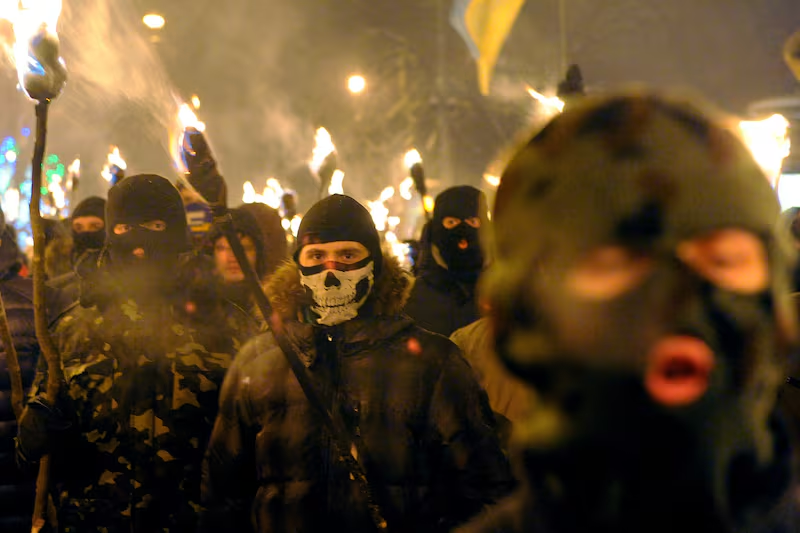“The Right Sector was armed and will be armed till the time when it will be necessary,” said the man in camouflage in the video. As if to prove his words, he pulled anAK-47 machine gun out from under the table of a local Ukrainian parliament. “You did not give us this weapon and you will not take it away. Who wants to take away my machine gun, my pistol, my knives? Let them try! As Americans say, ‘God made every man different; Sam Colt made them equal!’ I will put aside my Kalashnikov only when order in Ukraine is restored.”

Posted on YouTube earlier this week, the video went viral, racking up more than 50,000 views in three days. Another Right Sector video popped up online this week, showing the far-right activist Olexandr Muzychko, aka “Sashko Bilyi.” The banner advertizes: “Watch the new video “Sachko communicates with a prosecutor”! Click here!” In it, Bilyi roughly yells at the prosecutor of the Rivno region, snatching his tie and threatning to pull him to the Maidan trussed up by a rope. Interior Minister Arsen Avakov condemned the video as “not an exaggerated manifestation of the hunt for justice, but sabotage against people’s faith in possible order.” Bilyi may have thought he was clowning around, but his particular brand of hooliganism demonstrates the sort of problems the Right Sector may have as it looks to enter into national politics. Absolutely marginal before the events of the Euromaidan, the far-right helped win the struggle against Yanukovych and has gained some prominence—but now that the struggle is over, they just keep on fighting.
The Right Sector is a confederation of several right and far-right organizations and groups such as “Patriots of Ukraine,” the Social-National Assembly, Stepan Bandera’s All-Ukrainian Association “Trident,” Kyiv Organization’s “White Hummer,” and the UNA-UNSO. The Right Sector trumpets the ideology of Ukrainian nationalism, which reaches its zenith in the Ukrainian Insurgent Army, which in its heyday was lead by Bandera. (He was assassinated by a KGB agent in Munich in 1959.) From 1942 to 1954, the group acted fought against the German and Soviet Armies. Now, its descendent organizations are dedicated to advancing the 20th-century throwback notion of the primacy of the nation-state. Their rhetoric may sound utopian (or dystopian), but it’s actually quite archaic. “If non-Ukrainians understand Ukrainians’ urge towards their nation, and are disposed to it and help in struggle, we are disposed to them too; if they are neutral and don’t prevent us in our struggle, we are neutral to them, too; if they object our right to be a nation-state and work against us, we are hostile to them,” Bandera once said.
Of course the role that the Right Sector played in the Euromaidan cannot be underestimated. When two months of protests in the streets got almost no attention from Yanukovych’s government and just tightened the screws on society—with parliament voting on new draconian anti-protest laws and pro-government thug squads kidnapping and killing civil activists—it was the far right that first started to talk back to Yanukovych in his own language. They were the first to throw Molotov coctails and stones at police and to mount real and well-fortified barricades. They were amongst those who burned two military troop carriers that attacked the barricades on February 18. The Euromaidan won thanks to the resoluteness of people who were ready to fight rather than to negotiate in parliament when any negotiation became pointless. But now the situation on the ground has changed and the role the far right will play in the future of the country is an open question.
As University of Ottawa political scientist Ivan Katchanovski writes: “The far right in Ukraine has now achieved the level of representation and influence that is unparalleled in Europe. A member of Svoboda, a name adopted by the Social-National Party in 2004, became the Minister of Defense. Svoboda members also control the prosecutor general office, the deputy prime minister position and the ministries of ecology and agriculture. The paramilitary right sector has de facto power at least in some Western Ukrainian regions, such as the Rivne and Volyn Regions. Anriy Parubiy, the commander of the “Maidan self-defense,” has been appointed the head of the National Security and Defense Council, and [Dmitro] Yarosh, the leader of Right Sector, is expected to become his deputy.”
Katchanovski and other analysts are concerned that people with radical views are not suitable for the dull routine of politics. German political scientist and expert in far right ideology, Andreas Umland, disagrees: “Svoboda is probably still to be counted as ultra-nationalist, but has a foreign policy agenda and electorate untypical for far-right parties.” Umland may be correct in part—on February 26, Right Sector management and Yarosh met with with Israel’s ambassador to Ukraine, Reuven Din El. “Our movement will adhere to a policy of tolerance unto national questions,” Yarosh declared to Din El. “We will give up and stop any manifestations of chauvinism and xenophobia.”
But there are several areas in which the Right Sector still holds outdated and ultra-conservative views. In his video address “Great Ukrainian Achievement: What does Right Sector struggle for?” Yarosh says: “We are against degeneration and totalitarian liberalism, but we support traditional morals and family values, against the cult of profit and depravity.” What Yarosh means here when he says ‘degeneration’ is ‘homosexuality.’ When he says ‘totalitarian liberalism,’ he means that the right of the nation trumps human rights. Right Sector websites actively use such strange terms as “liberal homodictatorship” when they talk about modern open Western societies. One should note that while the far right is good in fighting, they might prove very problematic for Ukraine’s modern, open future.





